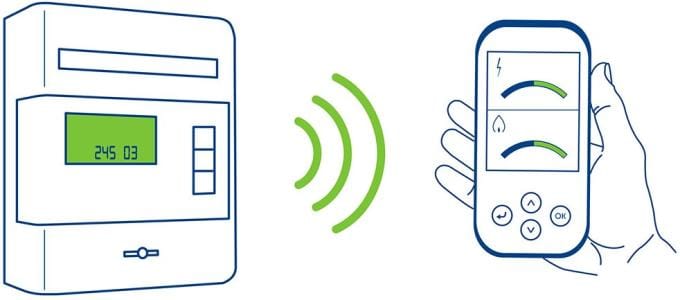Smart meters are a potential replacement for your electricity and gas meters. They can establish two-way communication with the power supplier by reporting the energy consumption daily (or in any other time interval). They can collect electricity consumption reading frequently, say every 1 hour, store it internally then transmit it once a day to save bandwidth. There can be various ways of transmitting the collected data like GPRS network, Wi-FI, wireless mesh networks and so on.
How Do Smart Meters Work?
Smart Meters connect to your wi-fi network or establish a connection with the supplier through a power line carrier (PLC). They log your electricity consumption on the fixed time intervals and either immediately transmit the logged data to the power company or aggregate data and transmit it once a day to save bandwidth. In case your meter sends out data on the set time intervals, say every 30 minutes, you will have a near real-time access to your data through either the supplier's website or a local connection. if your electricity goes down a smart meter immediately notifies the grid company enabling a faster response time for fixing the issue.
Advantages of Electric Smart Meter
Advantages of having smart meters installed in your house may be that no electricity or gas supplier employee will bother you asking to see the meter readings - they are transmitted without human intervention. Besides you can have your usage data available to you digitally. This will make it possible for you to analyze energy or gas usage patterns and reveal how you can save on utility bills. Energy supplier can also help you make informant decisions for saving energy by enabling you to compare your energy usage for some period, say 2 months, to the same period a year ago. Smart meters can also account for net metering. That is if you have your own solar panels generating electricity you don't have to measure the solar power output separately, just connect it to the same meter and if it produces more energy than the house consumes you may be credited or otherwise compensated by your grid company.
Current Developments
As reported by the British "The Telegraph" grid companies may use the data from smart meters to introduce new tariffs that may fluctuate hourly or even every half an hour. This means the peak hour electricity usage in the mornings and in the evenings will be charged the highest rate to encourage even distribution of energy demand. The hope is that smart meters coupled with smart home gadgets can achieve more efficient energy consumption habits. Besides, as EV (electric vehicle) market is expected to grow in the future, the regulators hope that grid companies will meet the new increase in electricity demand introduced by EVs without costly reinforcements to the existing grid infrastructures.




Comments